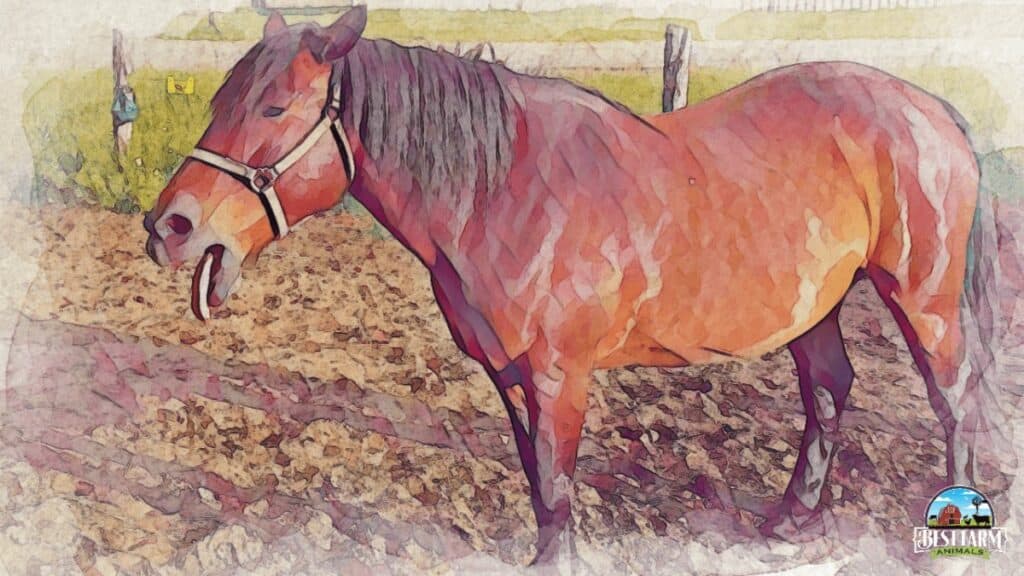Horse dehydration is a major, and deadly, problem for horse owners. And I didn’t know that until I brought my horse in from the pastures and noticed he was sweaty, lethargic, and slightly off-color.
He wasn’t his usual happy self. I feared it was colic or some other digestive issue. I would have never considered equine dehydration, despite the hot summer days we were experiencing.
Fortunately, my friend, who worked as a vet tech, was spending the day with me at the stables. She instantly recognized the signs of dehydration, and we were able to take the necessary steps to get my horse rehydrated again. My horse was able to recover.
My friend explained that horse dehydration could be fatal if not correctly diagnosed and quickly treated. Here is what to look for and how you could save your horse’s life.
What can causes dehydration in horses? Horses that have dry upper lips and sticky eyes have signs of dehydration, mainly caused by insufficient water intake. Excessive exercise (and sweating) that upsets their electrolyte balance, poor diet, and a mineral deficiency all add to dehydration. When horses have inadequate water in their digestive and muscular systems, they weaken, may suffer colic, and could even die.
If a horse is dehydrated, you must take action immediately to relieve it from what its feeling. But, how can you hydrate your horse fast? Find out below.
Table of Contents:
- Horse Dehydration: How Long Can A Horse Go Without Water?
- 2 Easy Steps to Identify a Dehydrated Horse: How Do You Know If a Horse Is Dehydrated?
- What Other Dangerous Problems Can Dehydration Cause?
- How Do You Get a Horse to Drink Water?
- Give Your Horse a Clean, Fresh Water Every Day
- Water Before and After Meals Should Be Provided to a Horse
- Add Water to the Horse Feed to Keep it Moist
- Encourage Your Horse to Drink by Adding ‘Sweetwater’
- Get Rid of Hay Dust by Soaking it Before Giving to Horses
- Add Salt to Your Horse’s Water to Balance its Sodium Levels
- Mix a Fruit-Flavored Water to Force the Horse to Drink
- What is the Fastest Way to Rehydrate a Horse?
Horse Dehydration: How Long Can A Horse Go Without Water?
A horse can only last up to 48 hours without water, before it will show signs of a dehydrated horse. , The horse’s body comprises 61% water, so having no access to any liquid substance are proven fatal to a horse. A horse will lose water and electrolytes through urination and sweat, the same as humans.
Sweating is the primary cooling mechanism for a horse, so just by standing in the pastures, a horse will lose electrolytes by trying to cool themselves down. You might not notice this because sweat can evaporate quickly, especially during hot days.
During strenuous exercise, a horse can lose up to three gallons of water per hour and 10% of its body weight in sweat. Therefore, your horse could become severely dehydrated if they do not get sufficient daily water to replace the fluids and minerals lost during excessive sweating. The result is that there is not enough water to support bodily function, causing several different life-threatening problems.
2 Easy Steps to Identify a Dehydrated Horse: How Do You Know If a Horse Is Dehydrated?
To know if a horse is dehydrated, look for signs of fatigue, weakness, dry mucous membranes, lack of interest in their food or water, rigid skin, and trembling or shivering. In severe cases of dehydration, you might notice your horse show these specific symptoms.
It’s essential that you identify when your horse is dehydrated quickly. A delay in identifying dehydration can mean illness, heatstroke, or even death. Fortunately, you can identify dehydration quickly with these two steps.
1. Check The Capillary Refill Time by Pressing Horse’s Gum
You can check the capillary refill time by pressing your finger on the horse’s gum. It usually will take one to two seconds for the gum to return to its normal color, which should be salmon pink. If the refill time takes four seconds or longer to return to the normal color, your horse might be dehydrated.
In a hydrated horse, the texture of the gums will be almost slimy and moist. In a dehydrated horse, the surface of the gums will be tacky and dry.
2. Do A Horse Dehydration Pinch Test
The second test you could do is called the pinch test. Pinch and pull the skin on the horse’s shoulder or neck. Once you let go, the skin should easily snap back into place. If the skin stays in the pinched position for more than four seconds, your horse is severely dehydrated.
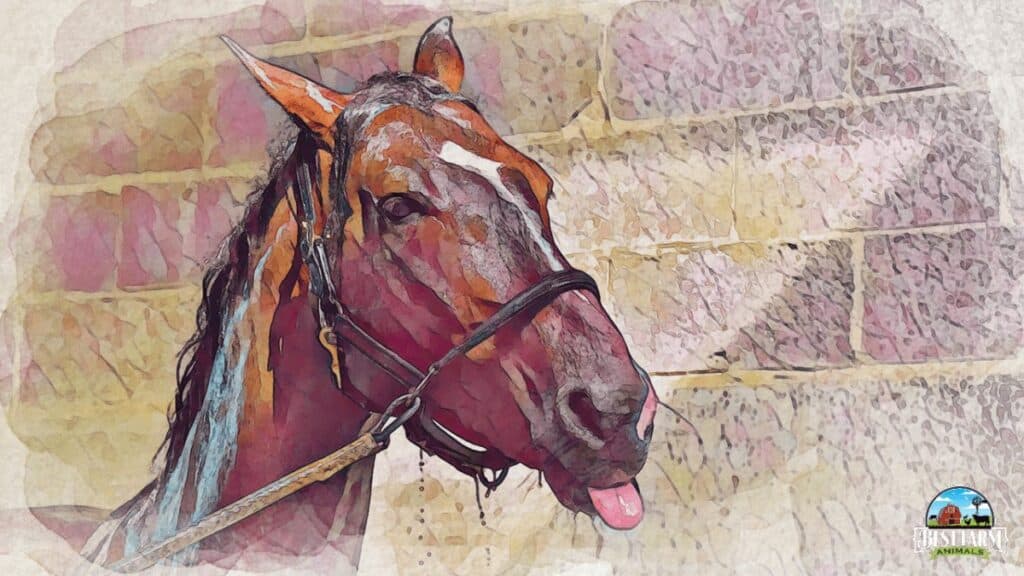
What Other Dangerous Problems Can Dehydration Cause?
Horse dehydration can cause impaction colic, Rhabdomyolysis or tied up muscles, kidney issues, and more. Once a horse lacks water, there are also the possibilities of recurring problems in the horse’s breathing, rapid loss of fluids, etc.
Impaction Colic
Dehydration is one of the biggest causes of Impaction Colic. Impaction colic is when dry food gets stuck in the pelvic flexures of the large intestine, blocking the flow of the food bolus through the tract and causing an impaction.
The food will become moist in a hydrated horse, making it easier to pass through the intestines. In the dehydrated horse, the exact opposite occurs, and there will also be a sort of dryness to the gut itself, causing food to stick to the gut lining.
Digestion will slow down, making it difficult for feed to move through the intestines, resulting in impaction colic and severe constipation.
Tying-Up or Rhabdomyolysis
Tying-up or Rhabdomyolysis is a muscle metabolism condition which can happen once a horse has no access to water.This generally occurs after or during exercise. It is when the muscle groups of the back and hindquarters start to contract and then cannot relax, causing pain and stiffness.
Many factors lead to your horse tying up; incorrect diet, increased work when the horse is incapable, hormone imbalance, genetic inheritance, selenium, and vitamin E deficiency.
Dehydration and a severe lack of electrolytes have proven their role in the tying-up diagnosis. Electrolytes, especially calcium and magnesium, are crucial for proper muscle function and efficiency.
When a horse is dehydrated and doesn’t get the necessary electrolytes, there will be a mineral imbalance. The muscles will not get the required nutrients and minerals needed, causing stiff, sore muscles and eventually causing the horse to tie up.
Thumps or Synchronous Diaphragmatic Flutter (SDF)
Thumps or Synchronous Diaphragmatic Flutter (SDF) is when the phrenic nerve, becomes overly sensitive or hyper-extended due to an electrolyte imbalance and dehydration. This nerve is essential for regulating the horse’s breathing.
The nerve struggles to receive direction from the brain and cannot control the diaphragm. The diaphragm then starts to respond to the heart chambers that initiate the heartbeat, and the diaphragm begins to vibrate with every beat of the horse’s heart.
SDF is most commonly associated with exhaustive exercises like endurance riding or racing. These horses often exercise for a long time and sweat profusely during their workouts.
When doing this type of exercise, it is very important that the horse is well-hydrated and gets an electrolyte supplement. Giving your horse water will not prevent or cure this type of problem.
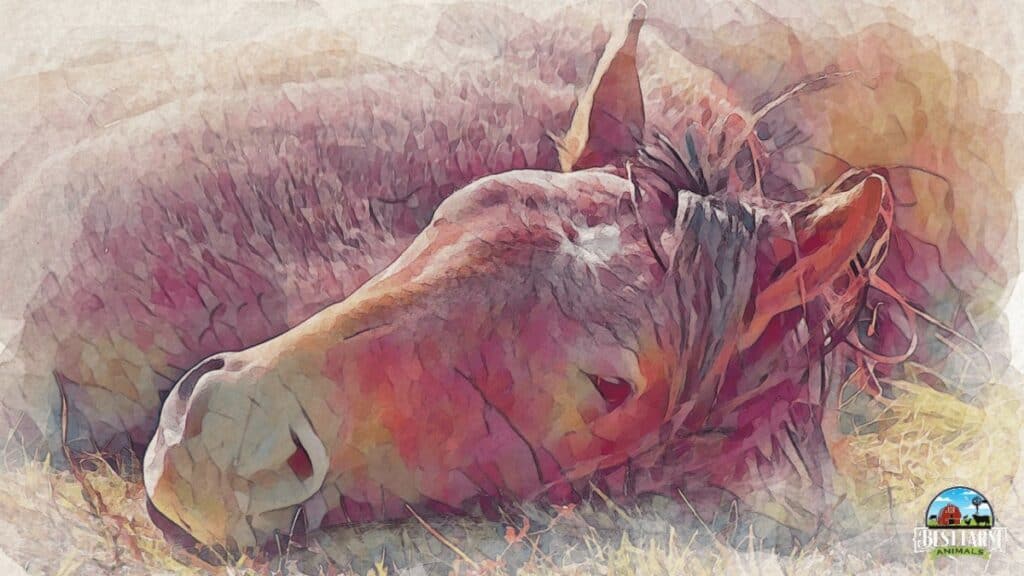
Kidney Problems
Although kidney problems in horses are rare, some factors may contribute to kidney problems due to dehydration. Colic, shock, an overdose of certain medications, bacterial infection, heatstroke, and dehydration can result.
Your vet will use certain drugs to treat colic or diarrhea, such as nonsteroidal anti-inflammatory drugs, aminoglycoside antibiotics, or tetracyclines. These drugs can be toxic to the horse’s kidneys, especially if the horse is dehydrated. The vet will keep this in mind and attempt to balance the necessary treatment with kidney health.
Kidney failure is treated with intravenous fluids to flush renal toxins and excess electrolytes from the blood. The prognosis for kidney failure may be bleak. Horses that suffer from mild to moderate kidney failure may survive, but they will still have abnormal kidney function for the rest of their lives.
Any illness or stress that causes these horses to dehydrate can severely impact their kidneys. Bloodwork and possibly urine analysis are required every six months to monitor kidney function.
Hypovolemic Shock
Hypovolemic shock occurs when there is a rapid loss of fluids on horses. When your horse is sweating profusely, a lot of fluids are lost. The fluid loss could lead to inadequate circulation and poor oxygen delivery, causing the body to shut down and go into a hypovolemic shock.
Hypovolemic shock is a scary situation, and the vet should be called immediately to give the horse IV fluids, which will hydrate the horse and improve circulation and oxygen delivery.
The damage can be permanent or fatal when a vet isn’t consulted in time or the horse isn’t hydrated correctly before muscle death occurs.
How Do You Get a Horse to Drink Water?
To get a horse to drink water, add a sweetwater or a fruit-flavored water in the horse’s bucket. A dehydrated horse will most likely resist to drink water, so you have to make it tastier. After all, there’s a phrase saying “you can lead a horse to water but you can’t make him drink.” Before discussing how to rehydrate a horse, let’s talk about preventing dehydration.
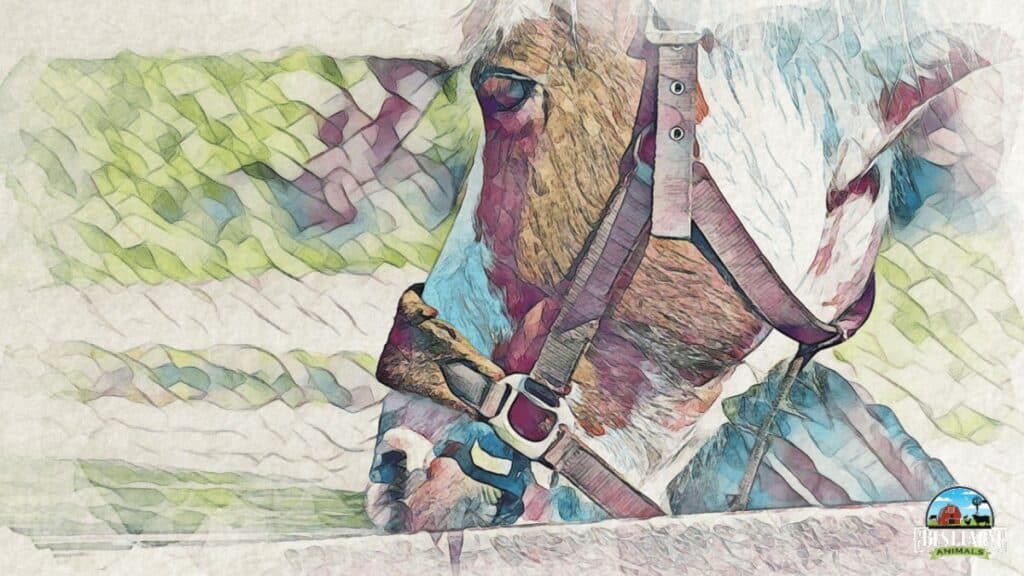
Give Your Horse a Clean, Fresh Water Every Day
Always have fresh, clean water in the pastures and stables for your horses. Make sure you clean the water buckets/troughs regularly. Most horses will not drink contaminated water.
Cleaning the buckets will also ensure the water doesn’t become stagnant. Stagnating water is an excellent environment for bacteria incubation and attracts mosquitoes and other biting insects.
Water Before and After Meals Should Be Provided to a Horse
To prevent dehydration, make sure the horse has water close by before and after finishing a meal, as this will aid digestion. Water enables food to be moved along the digestive tract more quickly and facilitates the uptake of water-soluble nutrients into the body.
It’s recommended always to monitor your horse’s drinking and eating behaviors since it has a sensitive stomach. A horse can suffer a lot of health conditions, even by just swallowing their food.
Add Water to the Horse Feed to Keep it Moist
Adding water to concentrate feeds will keep the food moist for your horses, allowing it to move through the gut quickly. On hotter days or when you feel your horse has not had enough water, you can add more water to their feed, almost making a hydrating soup. Your horse will still enjoy the meal and get extra water into their bodies.
Encourage Your Horse to Drink by Adding ‘Sweetwater’
Adding molasses to the horse’s water bucket creates a ” sweetwater mix.” Make sure you have an extra bucket of normal clear water close by, as the sweetness of the molasses will encourage the horse to drink more water. The sugar in the molasses will also give energy to your horse, plus it contains potassium, which is good for your horse’s health.
Get Rid of Hay Dust by Soaking it Before Giving to Horses
Soaking hay is a great way to get rid of the hay’s dust and aid in the roughage’s movement down the digestive tract. It’s also another way to add extra water to the horse’s diet. You can soak the hay for 10 minutes or longer. This doesn’t change the consistency of the hay, but it can affect its sugar content.
Add Salt to Your Horse’s Water to Balance its Sodium Levels
Adding salt is a great way to ensure your horse’s sodium levels are met, and salt uptake encourages your horse to drink (sodium triggers their thirst response). A low sodium level will not signal a horse’s brain to drink water, which results to possible dehydration and other worse conditions.
Mix a Fruit-Flavored Water to Force the Horse to Drink
If your horse is fussy with their water intake, providing watered-down apple juice can encourage the horse to drink. Take note that fruit-flavored water doesn’t have the same consistency and nutrients as a fruit juice. A fruit-flavored water is made by slicing any scented fruit or vegetable and putting it on a cold water.
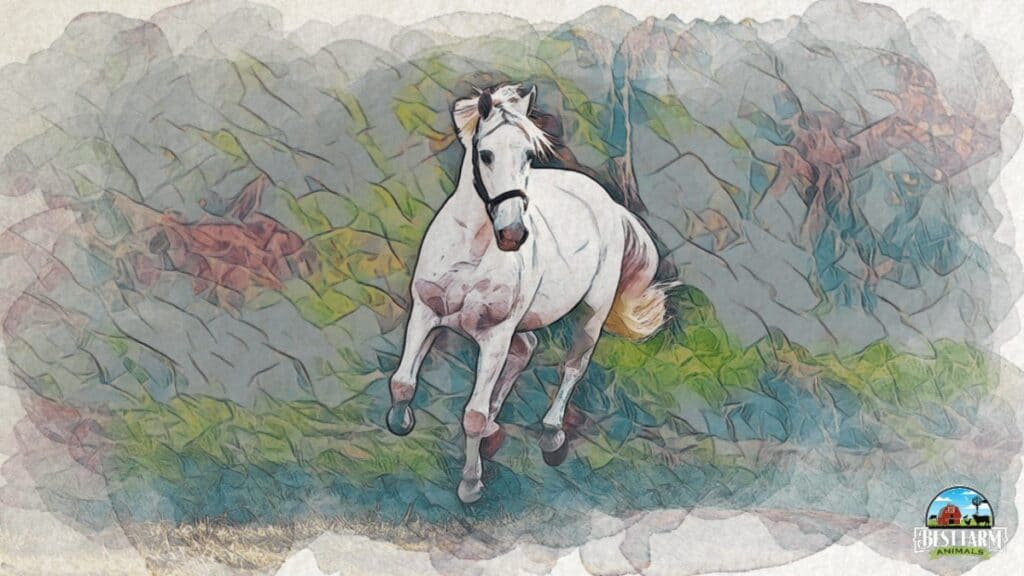
What is the Fastest Way to Rehydrate a Horse?
The fastest way to hydrate a horse is by giving it IV fluid and letting your veterinarian administer the process. If dehydration is treated quickly, the horse will soon bounce back and perk up.
Talk to your vet about what kind of electrolyte supplement will be best for the horse: an electrolyte paste or an electrolyte powder added to their water buckets or feed.
How long does it take to get a horse rehydrated? Depending on the severity of dehydration, the horse could take many days to recover. Remember that the horse will be sluggish and fatigued during this recovery period. Your horse may also lose weight and condition and won’t have a big appetite for food or water. Being weak and disinterested in food or water makes it difficult to hydrate a horse that’s lost so much fluid.
Encouraging the horse to drink water by adding watered-down apple juice into their water buckets, giving electrolytes, or adding salt to their feed is essential. Heavily watered beet pulp is also a good way to introduce water into their feed.
Rehydrate Your Horse With These Steps:
- Add water to horses feed to make it moist
- Provide fresh, clean water
- Provide water before and after meals
- Add a fruit flavor to help the horse to drink more water
- Add an electrolyte supplement
- Add salt to horse’s diet to ensure balanced nutrients
- Watch for signs of illnesses that contribute to dehydration
- Observe dehydration as soon as possible so you can take immediate steps
Electrolytes for Horses: What They Do
Electrolytes are mineral salts that are essential to horses for metabolic processes. The horse’s body depends on these electrolytes to maintain blood flow to vital organs. Electrolytes improve muscle health and efficiency, sustain nerve impulses, and facilitate the circulatory system.
Give electrolytes to your horse on hot summer days and after intense work, as the horse will sweat a lot while trying to cool themselves down. Electrolytes are found in blood, within cells, and in the surrounding fluid of the cells (interstitial fluid).
It is essential to understand how and why each mineral affects your horse’s body and how a deficiency could negatively affect them. Electrolytes contain five important minerals that help a dehydrated horse:
Horses Need Sodium to Trigger Thirst Response
Meet the sodium requirement for your horse by adding salt to their diet. Sodium regulates the thirst response and allows the horse to drink water when needed.
A low sodium concentration won’t trigger the horse’s thirst response. Therefore, the horse doesn’t get thirsty and won’t drink. The risk of dehydration increases, and other complications will arise.
Chloride Helps Horses to Sweat and Regulate its Fluid
Chloride helps regulate fluid and balances the pH in the body. When the chloride concentration is low, the body will slow down the sweating process or even stop sweating, trying to preserve as much fluids as possible. A horse that doesn’t sweat will overheat, dehydrate, and become ill.
Adding salt to the horse’s diet will give the body the correct chloride levels needed to regulate fluid balance.
Horses Get Potassiumfor Muscle Contraction
Potassium is essential to horses’ cell function, ensuring muscle contraction and nerve impulses are not over or under-reactive. Forage contains high level of potassium, which why it’s a good feed for horses. However, don’t be too careless as overdose of potassium can also give horses hyperkalemia.
Magnesium Aids Horses for Muscle Relaxation
Magnesium is essential to horses for muscle relaxation and nerve function. This is a vital mineral that keep’s the horse’s body to properly function, especially horses that are heavily-exercised. Magnesium also aids horses that are still young and growing.
Horses Need Calcium for Their Bones and Teeth
Like magnesium and potassium, calcium is essential for muscle contraction and nerve function of horses. The majority of the horse’s calcium is found on its bones and teeth. Thus, it’s important to make the mineral intake is balance. Although it’s healthy for horses to consume calcium, you can also give too much calcium on a horse.
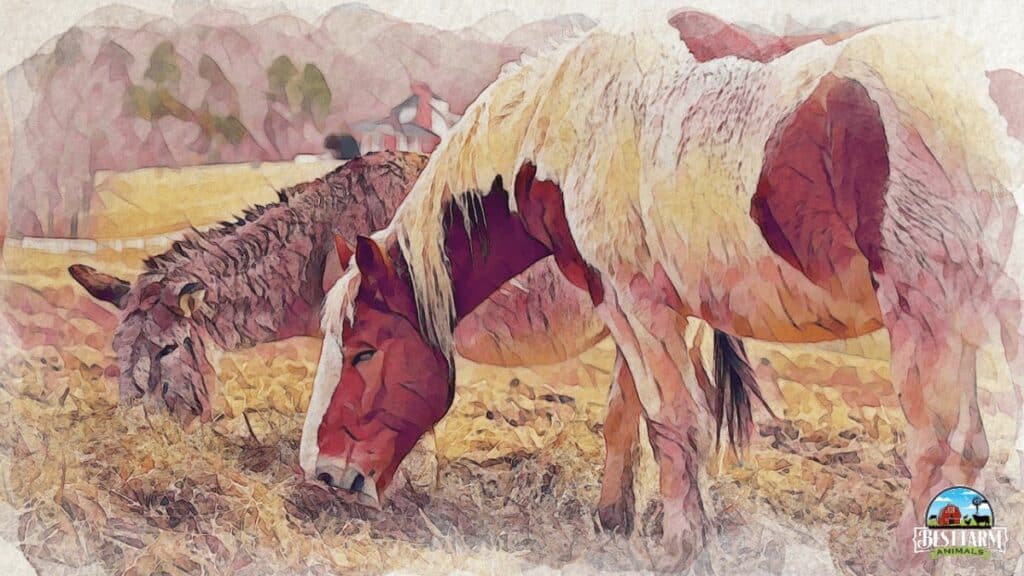
Where to Find Natural Electrolytes for Horses?
Most grazing, hay, and commercial feeds contain natural electrolytes. Feeding a well-balanced diet to your horse will supply the body with high levels of minerals such as potassium, magnesium, and calcium.
However, forage only provides micro sodium values, not the sodium levels a horse needs. For your horse to meet their sodium needs, add salt to their diet and offer a salt lick in the pasture or the stable.
How Often Do You Give Electrolytes to Horses?
Horses need about 60 grams of electrolyte every one or two hours. Horses in extensive work and sweating over long periods lose a lot of electrolytes and will need an electrolyte supplement to replace the lost minerals. Ensuring your horse has balanced electrolyte levels supports optimal performance, faster recovery after exercise, and better rehydration.
Horses at maintenance or living in cooler climates don’t sweat over long periods. When these horses aren’t in extensive work, they typically get adequate electrolytes from their diets. Only add salt to their feed to address deficiencies and balance their sodium requirements.
Adding just salt to their diet will only replace some electrolytes that have been lost. It would be best if you gave the horse a specific electrolyte supplement. An electrolyte supplement is balanced so that the minerals (sodium, chloride, potassium, magnesium, and calcium) are available in the ratios the horse can readily absorb.
Your horse will suffer from dehydration if electrolytes are deficient; life-threatening conditions like colic and more can happen.
Equine Dehydration Clinical Signs Chart
| Percent Dehydrated | Clinical Signs of Dehydration | Level of Criticalness (1-5, where 5 is deadly) |
| < 5% dehydrated | No clinical signs | 1: Minor |
| 5-7% dehydrated | Tacky/Dry mucus membranes Prolonged CRT (Capillary Refill Time = skin sticks together) + – Mild depression | 2: Horse needs water immediately |
| 8-10% dehydrated | Above and: Prolonged skin tenting Weak peripheral pulses Cool extremities Slow jugular refil Moderate tachycardia Depressed mentation | 3: Critical. Horse needs water immediately. May need twice as much water to regain hydration. |
| 10-12% dehydrated | Above and: Cold extremities Obtunded mentation Severely prolonged skin tenting (Does not return to normal position) Severe tachycardia | 4 Severly critical. Time is of the essence |
| >12% | Above and: moribund/comatose recumbent Severe tachycardia or bradycardia | 5 Death is most likely outcome. |
Horse Dehydration FAQs
Can My Horse Go Without Water For 12 Hours? A horse can go without water for 12 hours, but this doesn’t mean the horse should. A horse can typically go up to 48 hours without water; however, a water-deprived horse suffering for this long will suffer dehydration and other life-threatening health issues. Ensure your horse has enough water intake every day to prevent any possible problems that could occur.
Can My Horse Go Without Water for 24 Hours? Although a horse can go without water for 24 hours, it is not advisable. Horses need access to water to avoid dehydration; the dehydration’s severity increases the longer horses go without water. At 24 hours, horses can be severely dehydrated, especially in heat or while working, running, or walking.
Can You Give Your Horse Gatorade or Pedialyte? There isn’t any actual harm in giving a horse Gatorade or Pedialyte unless this is all you give a dehydrated horse. These electrolyte supplements/drinks are for human consumption; therefore, the mineral content will be based on human mineral requirements.
Horses sweat way more than humans, so a horse will need more mineral content than humans. Giving your horse Gatorade or Pedialyte will not really effectively hydrate them.
My Favorite Equine Resources For Horses and Donkeys
This list contains affiliate products. Affiliate products do not cost more but helps to support BestFarmAnimals and our goal to provide farm animal owners with accurate and helpful information.
Squeaky Chicken Toy is hilarious to watch and the horses love it! It’s not super tough so keep it away from dogs.
Dewormer with Ivermectin: I use this for my horses and my goats. Duvet makes a great dewormer. I switch between the Ivermectin one and one like this one so the worms don’t get immune to it.
Manna Pro Apple Flavored Nuggets are a delicious smelling treat that my horses go crazy over.
Equinity Amino Acid Supplement for Horses makes a big difference for any horse that’s struggling with arthritis, hoof issues, or just generally. It’s great for older horses who can’t absorb all the nutrients in their food as well!
Manna Pro Weight Accelerator helps older horses gain weight and stay healthier! This was especially helpful when one of my older horses lost weight over the winter and helped her regain her weight over the summer!
Farnam Fly Control goes on the horse or donkey and will keep the flies off your sweet pet. It makes horses way more comfortable and will keep sores from getting infected as well.
Wound Kote protects sores and wounds. It acts as an antiseptic and helps wounds heal faster. It works on both my horses and goats.
Conclusion
Act fast if you suspect your horse is dehydrated. Dehydration can kill your horse if not treated immediately. A dehydrated horse can die within three to four days, so as soon as you notice the symptoms of dehydration, you need to take the necessary steps to rehydrate the horse.
Call a vet immediately if your steps to rehydrate the horse are not working and the horse is showing no improvement. (Check their hydration levels with the methods described earlier.)
Always ensure the horse has 24/7 access to clean, fresh water, whether stabled or in the pastures. It is a good idea to check the water twice a day in case the water has gotten too cold or too hot or become contaminated with something that will put off the horses (like the time I found a dead chicken in their trough) and you can top up the water as needed.
Always observe how much water your horse drinks in a day. Establishing a baseline for their water consumption will help you decide whether your horse has drunk enough water today and allow you to take steps if they didn’t. Ensure your horse eats enough roughage to help absorb the water they drink, and learn more about feeding appropriately to prevent gas colic.
References
National Library of Medicine: https://www.ncbi.nlm.nih.gov/pmc/articles/PMC8039297/
American Association of Equine Practitioners: https://aaep.org/horsehealth/tying
Research Gate Published Study:

